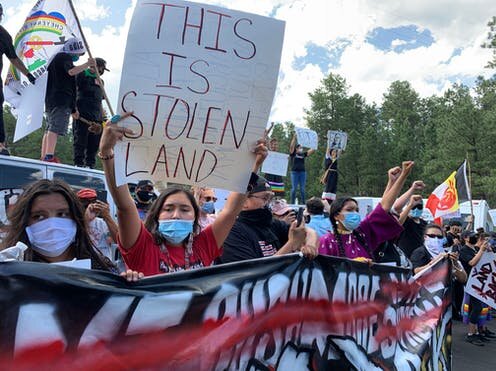The White Washing of History, One of America’s Favorite Past Times
By Dakota Hall
Native American protesters at the Black Hills, now the site of Mount Rushmore. Micah Garen/Getty Images
We all know the story, you know the one. The story that says when Pilgrims landed on Indigenous land, they instantly became friends with the Indigenous people and nations.
This old narrative of Pilgrims and Natives coming together to celebrate is a lie that is deep rooted into the American psyche. This is due to the systematic and institutionalized teaching of Indigneous people and the colonizers' relationship to them in the American education system. From textbooks to school theater productions, there is an initial misrepresentation to children that romanticizes a relationship in order to comfort and shelter American kids from the truth. That is the bedrock in which racism and erasure of Indigenous people and communities is now built upon in this country.
We can not, and must not, continue on the same path. We have been and continue to push forward on a critical point for Indigneous people and culture of not existing. For far too long Indigenous communities have been denied basic rights within this country. It was not until 1924 when Indigenous people were granted the right to citizenship in this country, we waited another 44 years to receive many of the rights guaranteed by the Bill of Rights. It was not until 1994 when an amended American Indian Religious Act was passed that Indigenous could use all traditional medicines in ceremonies.
Today across Indigenous reservations you will find the remnants of centuries long abuse and neglect delivered by the federal government. Everything from lack of infrastructure, access to clean drinking water, investment in schools, medical care, and so much more. These struggles are not the fault of the nations and their people, but directly due to the federal government failing to honor treaties and underfunding basic life necessities for Indigenous communities. To be clear, what I am not saying is that all this is because people choose to celebrate Thanksgiving, but the fact that on a federal holiday we choose to ignore the damage done but still be thankful, begs the question what are we thankful for?
Thanksgiving is not the only holiday that attempts to rewrite history. In the US, many holidays either directly or indirectly celebrate the genocide, taking of land & resources, and erasure of Indigenous people. Columbus Day and Independence Day are examples of Americans celebrating genocide. It was President Lincoln who proclaimed modern Thanksgiving as a national holiday, the same President Lincoln who signed off on the hanging of 38 Dakota Sioux men. To this day, it remains the largest execution in the history of the United States.
For Americans, this celebration is an unspoken problem. For some it is a fetish to celebrate the genocide of Indigenous people. For some there is deep rooted guilt to celebrate Thanksgiving due to their understanding the truth around the atrocities committed against Indigenous people, and thus their celebration is renamed: Friendsgiving.
But in the end, the history, purpose, and ingrained culture of the day is rooted in the oppression of Indigenous people. Thanksgiving is a day that is frustrating to many, but not all, Indigenous people. It's a reminder of past sins of disease, warfare, and massacres, but also a reminder that in 2020 there are still mascots and school plays that have White and non-Indigenous people dress up and “play Indian” while often mocking sacred dances, clothing, and ceremonies.
After what some would call a “race reckoning” in America, after the civil unrest, protests, and uprising due to the police murders of Breonna Taylor, George Floyd, and many others, America still seemingly can not properly address its harm towards Black or Indigenous Americans. When confronted with moments & opportunities to address systematic changes in this country, or to right the wrongs from centuries past & in today's streets, white America balks time and time again.
With 574 federally recognized tribes, many more states recognized, and many that have not received the recognition necessary to preserve their traditional home lands, Indigneous people are far from monolithic. There is not a single answer that could accurately represent the views, feelings, and opinions of so many nations. But what can be applied to every single nation, is that this country has failed them with broken treaties, and by actively re-writing history to wash America of its original sin.
For far too long the silent crisis of Indigenous people has existed with little-to-none mainstream attention. Little access to healthcare, education, and economic opportunities has created a generational crisis that has put Indigenous culture, language, and people in danger of no longer existing. The question today is not what is being served for dinner, but what are you doing to ensure Indigenous folks aren’t erased from the world?
How to Support Indigenous People
Seek out Indigneous authors, activists, artists, and chefs, and support their work. Listen to, and uplift their perspectives, and make sure your support goes beyond Thanksgiving & holidays like Indigenous Peoples Day.
Learn about causes that are still affecting Native people. This includes healthcare, violence against women, and land disparities.
Invest in and support Indigneous young people and their leadership.
Call your local school board and demand a review of curriculum that teaches around Indigenous relations and demand that accurate history be taught to children.


